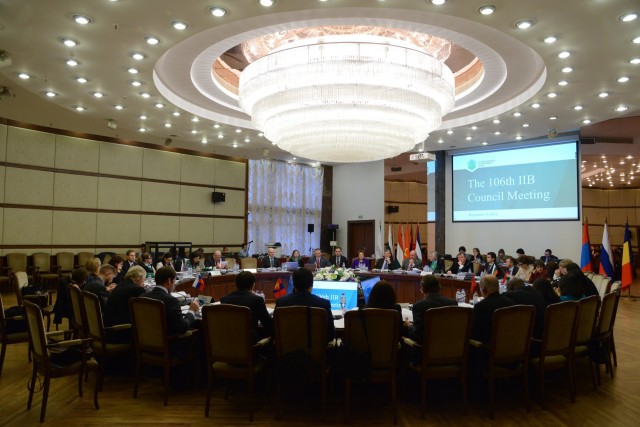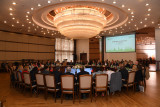Member countries approve main directions of IIB’s medium-term development at the 106th Council Meeting

On December 7-9, 2016, headquarters of the International Investment Bank (IIB) hosted the events of the 106th Meeting of the IIB Council – the Bank’s highest governing body. The session’s agenda focused on issues of the Bank’s further strategic development and its transition towards a new governance structure. A number of other operational matters were also discussed.
In his opening remarks, the Chairman of the IIB Board, Nikolay Kosov, noted: “The Bank has achieved financial stability, gaining momentum, and has increased its profile while becoming an up-and-coming member of the community of development institutions.” N. Kosov also stressed that among evidence of such developments is the decision by Fitch agency to upgrade IIB’s rating to “BBB” on December 7, 2016 – the first upgrade of any of the Bank’s ratings received from the major rating agencies as well as the first upgrade by Fitch of any international financial institution in the past three years.
During the Council in Moscow, member states’ delegations approved the main directions of the Bank’s further growth, as outlined in the IIB Strategic Vision for 2018-2022, which was prepared in close cooperation with the delegations and with assistance from consultants from the World Bank. Shareholders highly appreciated the work done by the Board and generally agreed with the document, adopting it as a basis for next year’s preparations of the Bank’s Development Strategy and country strategies for the next medium-term period.
According to the Strategic Vision, IIB’s growth is associated mainly with increase of its loan portfolio in each member state, focusing on syndications as well as integrational and flagship projects, with further diversification of its instruments, including the use of new funding sources, as well as with access to promising markets outside the Bank’s current geography. In this respect, the Regulation on the Special Status of Participation in the Activities of the IIB, approved by the Council and involving new types of cooperation such as status of an Associated Member or Associated Partner, will in the near future enable the institution to launch dedicated work on analysing options for expanding its operating territory in the interest of members states.
The meetings included focused discussions on issues of finalizing IIB’s transition towards new statutory documents and modernizing its governance structure as a prerequisite for successful implementation of its future strategy. During 2016, the Bank prepared corresponding proposals, based on the best international practices and with assistance from the World Bank, regarding its transition from a 2-tier to a 3-tier governing structure introducing the Board of Governors, the Board of Directors and the Management Board. Shareholders approved the Procedure for transition to the new corporate governance structure of the IIB and decided that the agenda of the first meeting of the Board of Governors will include the review and approval of regulations on new governing bodies, which have been agreed by the member states’ delegations during the 106th Meeting.
Among operational issues, the IIB Council approved financing for projects in Slovakia, Hungary and Vietnam for a total amount exceeding EUR 105 million. It is expected that the Hungarian transaction will become the Bank’s pilot project in the country and its largest guarantee, while the Slovak loan of EUR 60 million will be the largest in IIB’s portfolio and the support for Vietnamese SMEs, provided jointly with the International Finance Corporation, will be the Bank’s first syndication in the country. In addition, the decision was made to grant Observer status to the Bulgarian Development Bank and the Russian Export Centre, two strategic partners of the IIB. Countries also approved the Bank's budget for 2017.
The IIB continues the practice of supporting environmental programmes in the member countries and, as part of the events, it provided a grant to the international organisation Wetlands International for a project aimed at restoring peatlands in Russia. The funds of EUR 70 000 will be used for rewetting areas, where ecosystems have been disrupted by economic activity and which are located in several regions of the European part of Russia.
On the occasion of the Council Meeting, the Bank organised a Welcome Reception at the Reception House of the Russian Foreign Ministry. Apart from the heads of delegations of the Bank’s member states, the event was attended by senior officials from the Russian Ministry of Foreign Affairs and Ministry of Finance, heads of diplomatic corps, representatives of financial and banking institutions, international organisations and development institutions, accredited in Moscow, as well as by cultural figures.


